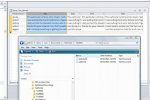I am not new to Access, but mainly only use it for queries. If I have posted this question in the wrong forum please direct me to the appropriate one.
I have a table that has over 6000 rows with two columns. One a title and the other a memo column with transcripts from interviews (some being extremely long). I do research using content analysis and to do that on these interviews, I need each one saved in its own text file.
Specifically I need to export each transcript into its own text file and save that file using the title from the other column. So I would end up with over 6000 text files all being saved using the title from the corresponding row as the transcript.
Is this even possible?
Thank you for any help that you could provide even if it is telling me I am asking too much of the program.
I have a table that has over 6000 rows with two columns. One a title and the other a memo column with transcripts from interviews (some being extremely long). I do research using content analysis and to do that on these interviews, I need each one saved in its own text file.
Specifically I need to export each transcript into its own text file and save that file using the title from the other column. So I would end up with over 6000 text files all being saved using the title from the corresponding row as the transcript.
Is this even possible?
Thank you for any help that you could provide even if it is telling me I am asking too much of the program.

